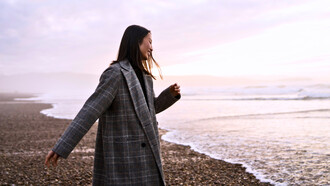A friend is one that knows you as you are, understands where you have been, accepts what you have become and still, gently allows you to grow.
(William Shakespeare)
One of the more challenging confrontations of my adult life has been friendship. I have been a man of cliques. I found safety in groups. Bullied in early childhood, I found that if I limited myself to a safe pact, only then could I truly feel safe. But at some point, I too, became the bully. I found myself believing that in this world either you find a target or you become the target. It’s a dog-eat-dog world.
So what exactly is it that I got out of bullying? Well, firstly, it was appreciated by those around me. Each chuckle was a gift of validation that I desperately craved. Look, I am funny. See me, I want to be seen. I am good at something, I know how to please a crowd. I am loved.
It was only in adulthood that I slowly started to see that there were flaws in this strategy to find love. The fundamental flaw, of course, was that I hated being bullied myself. If I heard anything that I perceived took aim at my weight, intelligence or my life decisions, I was up in arms. I knew that at some level, it felt absolutely horrible to be subject to condescending language. I would find myself ruminating for hours after a hurtful comment was made. I would think.. Am I really a loser, like she said? I am teaching history to 8th graders unlike my peers in school who appear massively successful. Maybe I have failed, and I am simply deluding myself. But she said she was kidding. Maybe, she was, but why doesn’t it feel okay? I had the added baggage of wondering if I was simply too sensitive, as I was often told, and that the fault lay within me for not being able to take a joke. In the fear of seeming sensitive, I often put on a half-baked smile and pretended everything was ‘all good’. It wasn’t.
True to Newton’s third law ‘every action has an equal and opposite reaction.’ How could I expect to be a perpetrator of bullying without expecting the gun to recoil? I suppose I bought into the idea that I was somehow immune to the prospect of being bullied. Primarily, because the clique that I co-created had original members with a free reign to pick on new members. A right of passage if you will. Eventually, these new members were not so new, and they certainly had justifiable resentment towards me for my earlier indiscretions. It’s insidious when I think about it as an adult, that subconsciously, I was attracting people who were eager to be accepted only to bombard them with rejection. The irony of it all was that I believed my own acceptance was predicated on the rejection of others.
Bullying is typically thought of as a middle and high school phenomenon but this could not be further from the truth. Left unaddressed, this can carry on throughout life. It can be passed on generationally, from parent to child, and then from that child to his own future child. Perhaps the question that needs to be asked is: how can I make my children feel loved? Or better yet, how can I make anyone who encounters me feel adequate and respected? This requires a shift in thinking, and it’s not how I have been raised to see the world. I was raised to believe that love was conditional. I was raised to hustle in the competition. Get ‘A’ grades not ‘C’ grades. Be skinny, not fat. Hang out with kids from your school, not the ‘other’ schools. And I failed all of these metrics. So what now?
Here was the game plan, to raise my self-worth, I had to lower the self-worth of others. If I could just make them feel the shame too, perhaps I would not have to bear the burden alone. I carried this attitude into college, and found myself cultivating a new clique with new targets and ‘allies’. I recall laughing as I shared with my friend ‘Yo, do you know what he said about you? He called you a broke ass… haha ha’. I’ll never forget the look on my friend's face when I shared this with him. He didn’t find it funny. He was upset. This friend of mine worked long hours at a local diner, working for tips to make his way through school. And instead of respecting him for this, I colluded in making his very strength into a source of shame.
As life passed, I started to feel a bit differently about bullying. I started to realize that while I could get a good laugh from the audience for making fun of people, at the end of the day I was left with a contraction in my body. That contraction I came to learn had a name, shame. With my therapist, I started to explore why I was rejecting people around me, even the ones who were offering me safety. It turns out that my avoidance and exclusion of others was an old survival mechanism to protect myself. The problem was that it had now outlived its purpose, and was harming my adult relationships rather than protecting me. But old habits die hard. I still found myself, holding back, very tightly, comments that I knew would please a crowd but crush a person. I was very tempted and allowed the occasional slip too. After all, I did not want to risk losing my identity in my group of friends. I was the comedian in the friend group, and what would I be if not that? If I dropped this act, would my friends give me the very thing that I was craving, acceptance? Perhaps, not. Was I willing to take the risk?
After some time, I just could not continue to justify feeling ashamed at the end of the day. So, I started to watch myself with greater discipline. I started to focus my energy on standing up to the bullying that I was facing in my life. I learned to say ‘Hey, that’s not cool’. And truth be told, it wasn’t easy. I felt guilty for changing the dynamics of my relationships. I started to allow my feelings to take a seat at the table and this was not always comfortable for my loved ones. I began to share when I was angry, sad or hurt. I also started to call out my friends when I felt they were engaged in bullying. Eventually, I noticed that my friends started inviting me over less often and even my mother and I had long periods where we did not talk to each other. Something was happening. It seemed like people around me were making it clear that they didn’t sign up for this new Hussnain. But I had no choice, the universe was pushing me in this direction.
While training as a therapist, I found community and connection with fellow trainees who knew or were at least trying to listen. I learned about boundaries and that not everything is a joke. I discovered that shame is incredibly powerful in navigating our lives in directions that don’t serve us. I learned in some moments to cry. To drop the mask that I held onto for so long, that if only I had accolades did I deserve love and connection. I also learned that I had deep pain, from longing to be accepted. I started to work on cultivating a warmer environment internally and to speak with myself the way I would to someone I truly loved. It has all made the journey easier.
Eventually, my desire to roll in cliques dropped significantly and I became more interested in cultivating friendships rather than searching for a role in a gang. I discovered that one-to-one conversations are incredibly rejuvenating and serve as an opportunity to learn from and listen to a friend. My humour evolved from bullying to banter, so that even when I found myself in group settings, laughter was shared equally and not reserved for the few. This isn’t to say I am perfect, I do find myself saying things that I later regret, but those instances are now far and few between.
Do I feel lonely sometimes? Absolutely. I do miss hanging out in groups. I do miss old friendships that don’t have the same quality that they once had. But I suppose as cliche as it sounds, change is the only guarantee in life. I didn’t stay 4 foot 5 forever, so why would I find myself with the same people in the same places as ten years ago?















